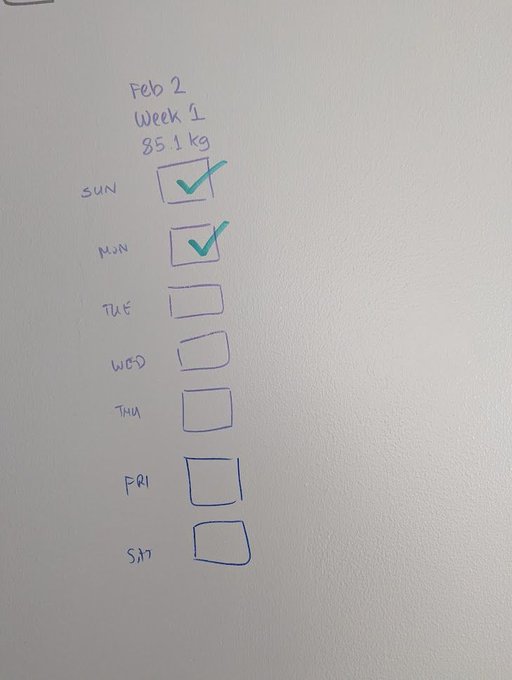On February 2nd, I woke up to my highest weight ever: 85.1 kilograms. Something clicked. Instead of setting a grand goal, I remembered advice from "Mini Habits" and "Atomic Habits" - start with tiny, daily habits that are impossible to fail.
i'm currently 85kg, the heaviest i've ever been. i'd like to drop 10kg in the next 3 months. starting this thread to track my weekly progress. i'll be asking myself 1 simple question, each day: "did i feel hungry today" yes = ✅ no =❌
The Mini Habit
I chose one simple question: "Was I hungry today?"
That's it. No diet plans. No calorie counting. Just checking if I felt genuine hunger at any point during the day.
Nine weeks in, I've lost nine kilograms - exceeding my initial expectations. But the real win isn't the weight loss. It's the fundamental shift in how I relate to food.
The Transformation
Before, hunger was an annoyance to silence immediately. Now, feeling hungry feels like winning. My baseline has shifted - I aim to maintain a slight hunger throughout the day rather than constantly feeling full.
Take ice cream: I used to eat two or three a day without thinking. I'd just eat them, feel a momentary sense of relief, and then go back to some sort of baseline. Now I have one in my fridge for two and a half weeks, untouched. Not because I'm resisting temptation, but because I don't crave it anymore. My satisfaction comes from feeling light and slightly hungry.
Why This Time is Different
This attempt feels fundamentally different from my previous weight loss attempts. Before, I was always working towards a goal - a number on the scale or a deadline. Once I hit that goal, I'd inevitably bounce back to my old habits. But this time, I'm not working towards an endpoint. I've changed my relationship with food itself.
The key difference is that I'm not resisting temptation or forcing myself to change. Instead, I've rewired what gives me satisfaction. Feeling slightly hungry throughout the day has become my new normal, and it feels good. I don't see this as a temporary state to endure until I hit some target weight - it's just how I live now.
Why Systems Beat Goals
This experience made me wonder: what other improvements could I make by focusing on systems rather than goals? As Scott Adams puts it in "How to Fail at Almost Everything and Still Win Big": "If you do something every day, it's a system. If you're waiting to achieve it someday in the future, it's a goal."
What's Next?
Now that I've established this new relationship with food, I'm curious about applying the same systems-based approach to building muscle. Instead of setting ambitious lifting goals or following complex workout plans, I'm starting with one simple question: "Did I train one muscle group to failure today?"
I'll report back in a few months on how this experiment goes. But if the weight loss journey taught me anything, it's that the key isn't in the grand plans - it's in the tiny, daily habits that reshape how you think about the whole endeavor.
